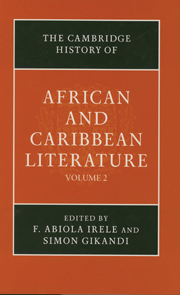Book contents
- Frontmatter
- 23 East African literature in English
- 24 Anglophone literature of Central Africa
- 25 West African literature in English: beginnings to the mid-seventies
- 26 South African literature in English
- 27 African literature in French: sub-Saharan Africa during the colonial period
- 28 North African literature in French
- 29 Francophone literatures of the Indian Ocean
- 30 African literature in Spanish
- 31 African literature in Portuguese
- 32 Popular literature in Africa
- 33 Caribbean literature in French: origins and development
- 34 Caribbean literature in Spanish
- 35 Anglophone Caribbean literature
- 36 The Harlem Renaissance and the Negritude movement
- 37 Postcolonial Caribbean identities
- 38 African literature and post-independence disillusionment
- 39 “Postcolonial” African and Caribbean literature
- 40 Modernism and Postmodernism in African literature
- Index
- References
24 - Anglophone literature of Central Africa
Published online by Cambridge University Press: 28 March 2008
- Frontmatter
- 23 East African literature in English
- 24 Anglophone literature of Central Africa
- 25 West African literature in English: beginnings to the mid-seventies
- 26 South African literature in English
- 27 African literature in French: sub-Saharan Africa during the colonial period
- 28 North African literature in French
- 29 Francophone literatures of the Indian Ocean
- 30 African literature in Spanish
- 31 African literature in Portuguese
- 32 Popular literature in Africa
- 33 Caribbean literature in French: origins and development
- 34 Caribbean literature in Spanish
- 35 Anglophone Caribbean literature
- 36 The Harlem Renaissance and the Negritude movement
- 37 Postcolonial Caribbean identities
- 38 African literature and post-independence disillusionment
- 39 “Postcolonial” African and Caribbean literature
- 40 Modernism and Postmodernism in African literature
- Index
- References
Summary
The earliest books in English relating to Malawi, Zambia, and Zimbabwe are David Livingstone’s (1813–73) Missionary Travels and Researches in South Africa (1857) and Narrative of an Expedition to the Zambesi and Its Tributaries (1865). Although on both expeditions he entered present-day Zimbabwe only briefly, Livingstone’s books serve to introduce the literature of the region. He regarded mission and colony as the necessary transforming agents for Africa and he hoped through his writings to convince Britons that Africans should be encouraged “to cultivate for our markets, as the most effectual means, next to the Gospel, of their elevation” (1857: 675). His enormous influence inspired two generations of missionaries, who introduced literacy, commercial agents, and administrators who had been instrumental in establishing a network of protectorates and chartered company colonies that put the entire region under British political control. The imperial impact and its multiple consequences including resistance to British domination became and still remain the main concerns of the literature that we will discuss in this chapter. Initially all the writers are white and the benefits of empire are promoted; once British control has been established its consolidation becomes a priority. In Southern Rhodesia after 1923 the growth of white nationalism can be discerned in white writing, which becomes more vociferous in response to an articulate black resistance throughout the region. This first opposes settler privilege and then imperialism itself and soon produces its own literature. The themes of post-independence literature remain public and the principal concern of much black writing is the recovery of a cultural identity that colonialism has shattered and the exposure of the corruption and sometimes despotism of the new political and economic elite who have taken the place of the colonial rulers.
- Type
- Chapter
- Information
- The Cambridge History of African and Caribbean Literature , pp. 445 - 471Publisher: Cambridge University PressPrint publication year: 2000
References
- 1
- Cited by

